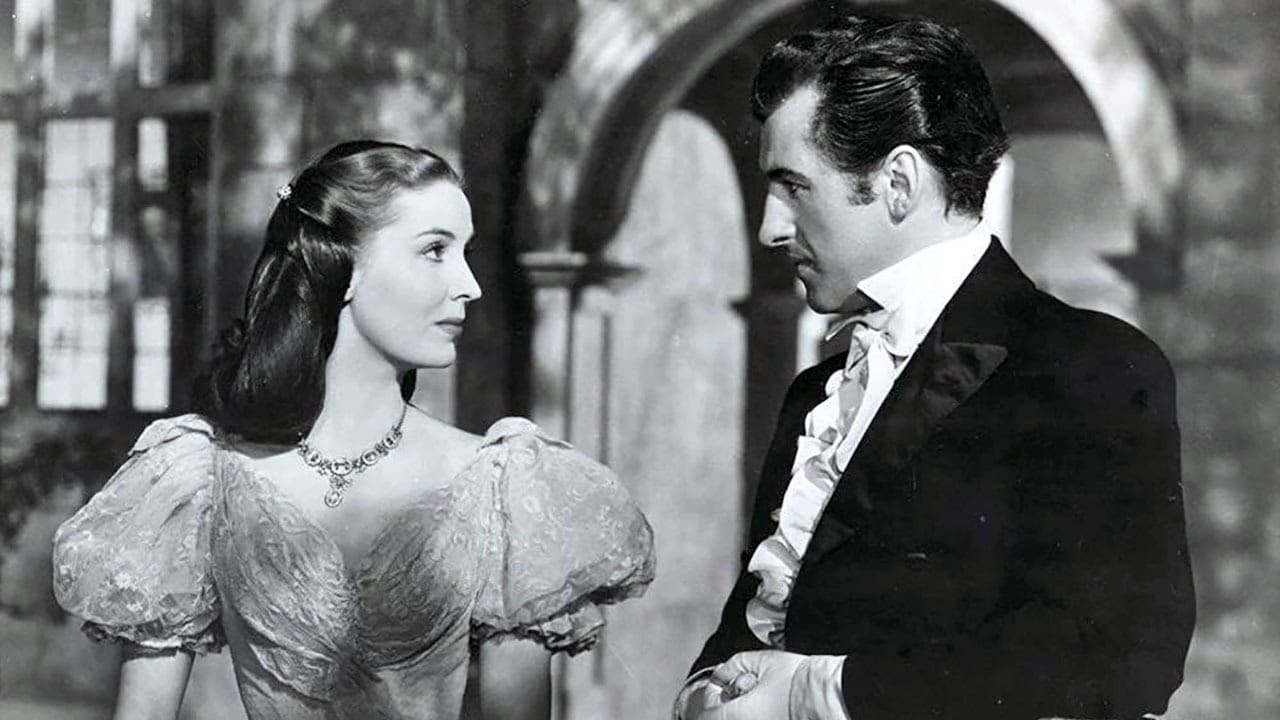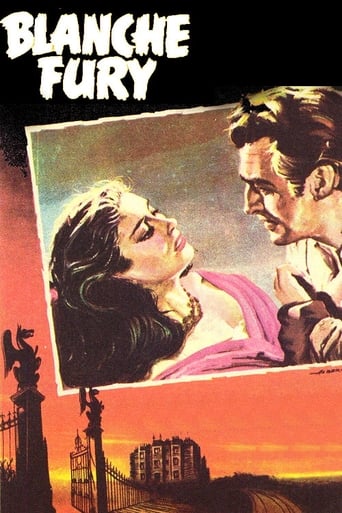



Very disappointed :(
Plot so thin, it passes unnoticed.
Am I Missing Something?
The movie really just wants to entertain people.
Valerie Hobson and Stewart Granger star in "Blanche Fury," a 1948 British film directed by Marc Allegret and featuring Michael Gough and Walter Fitzgerald.Hobson plays Blanche Fullerton, who is invited by her cousin (Fitzgerald) to work as a governess on his estate for the small child, Lavinia, who is heir to his estate. Since the house initially belonged to the Fury family, the heirs now call themselves Fury and suggest that Blanche do the same. The man who runs the stables, Philip Thorn, is the illegitimate son of the original owner and is trying to prove that the estate, Clare, is his.Blanche marries her cousin Laurence (Gough), though she is attracted to Philip, and they soon consummate their love. Then Philip finds out that though he believed his mother and the original owner were married somewhere in Europe, his attorney tells him there is no record. Philip, obsessed with Clare, doesn't want to take no for an answer.Really good Gothic story, based on a novel written about an actual case from the 1800s that comprises many elements in the film. Valerie Hobson is cool and lovely as Blanche, wearing some of the most sumptuous costumes ever. Granger looks like the hunk that he was in this era - and if you saw his physique in Cesar and Cleopatra, you know of which I speak - to die for. And there's Blanche, married to Michael Gough, a prolific and wonderful stage actor who nevertheless was no leading man.There are some good twists in this story, and I really got into the characters. The estate that was used for the exteriors of Clare, in Norwich, England is incredible. Really an enjoyable and entertaining film with a marvelous cast.
View MoreIf you want to approach the movie or the novel with virgin eyes, please be advised the following discussion may contain SPOILERS. Despite a number of changes, (some minor, some major), the movie represents a worthy effort to get the book onto film. However, commercial considerations posed obvious problems. The Blanche of the book is cold, tough, and not very likable. If her adversaries were the same or even more so, one might still root for her, but the people she regards as enemies or obstacles are simply dull and drab rather than evil. Since the movie wants to have box office appeal, and since it stars as Blanche the popular actress Valerie Hobson, the screenplay tries to soften Blanche's image, which takes some of the starch from the story. In the book, for example, the Stewart Granger character is married to an ailing wife. Since having Valerie Hobson engage in an affair with this married man would make her look bad, the movie simply eliminates the ailing wife. In the book Blanche's cousin (Michael Gough) is married to the meek, inoffensive Olivia. Blanche regards Olivia with casual contempt but since, once again, this makes Blanche look bad, Olivia is also eliminated from the script. (Michael Gough is now introduced as a widower with a young daughter.) With Olivia disposed of, the screenplay is now free to marry Blanche off to her widowed cousin but since Blanche wants the cousin out of the way so she can inherit his estate, the screenplay tries to "justify" Blanche's desire by turning this harmless drudge of a cousin into a rather mean and nasty character whose death is unlamented. A further effort is made to soften Blanche's image by having her desperately try to save little stepdaughter Lavinia from a horse-riding accident. In the book, little Lavinia is actually shot in the same "gypsy" attack which killed her father and grandfather. Finally, a pregnancy is added to the screenplay so that Blanche can be seen as somehow atoning for her sins by giving birth to a boy who will, presumably, restore his inheritance to a state of pride and purity. This continual softening of Blanche's character gives the movie a vaguely uncertain tone. One wishes it had been a bit tougher, leaving Blanche alone at the end with "the bitter fruits of self-reliance," but the screenwriters' desire to make their heroine more palatable is understandable and, despite its flaws, their movie still holds interest throughout and is, in its mounting and photography, a glory to behold.
View MoreBlanche Fullerton accepts an invitation to go and work for her wealthy Uncle out on the Clare estate. Tho the estate is the ancestral home to the Fury family, the Fullerton's take the name of Fury to be their own and run the estate as the rightful heirs. Philip Thorn believes he is the rightful heir to the estate but just can't find the proof needed to claim what he feels is rightfully his. Once Blanche enters the estate the men of the home have their heads turned, and from that point on Clare estate, and the whole Fury dynasty, is in danger of going down a very dark path that can may only lead to pain and misery. Is the ape curse of the Fury's about to strike again?There is a good chance that I'll be reviewing this picture with a hint of bias, for Blanche Fury has everything that I personally look for in a Gothic classic picture. Two lead stars firing on all cylinders, both Stewart Granger and Valerie Hobson positively ooze grace and quality amongst the glorious colour and corking costumes. The mansion of the piece is just perfect (Wootton Lodge, Staffordshire, England), a poetic stone built structure by day that is surrounded by rolling countryside, but by night it's a hauntingly monolithic place of dreams and simmering passions. The dialect perfectly befits the late 40s British setting, where the story itself is crammed with passions and dastardly motives, adulterous leanings and murderous intent. But above all else it's the ending that seals the deal, as our protagonists respective futures unravel in yet another trip down some dark twisty road. Based on the novel written by Joseph Shearing (who was actually Marjorie Bowen), the inspiration for the story is a real life case from 1848, this itself carries with it no small amount of potency, adding still further a fleck of nastiness to the unfolding drama. Blanche Fury is very much one for those who like Gothic melodramas or uneasy mansion set thrillers, the likes of Dragonwyck, House Of Usher, perhaps even Alfred Hitchcock's wonderful Rebecca. It's tightly directed by Marc Allégret and acted accordingly, whilst also technically the picture scores high as the score (Clifton Parker) and the photography (Guy Green/Geoffrey Unsworth) gives the picture an all round quality production. Blanche Fury, as a story itself? Well it's a little gem from the golden sub-genre of Gothic melodramas. At the time of writing Blanche Fury is still searching for a wider, more appreciative, audience, so if you get the chance to see it then don't pass up the chance because it's a must for fans of the films mentioned above. 8.5/10
View MoreA classic example of a very well-made historical drama of the late 1940's. In every respect it is faultless, given the constraints of time and the story compression inherent in all movie making. There are simply no movie actors or actresses today who could play the star roles with the same enormous presence, dignity, grace, self-assurance, and acting skill manifested by the superb and striking Hobson and Granger---not to mention their precise and exemplary articulation of the English language. These were manifestly adults, not today's mumbling urchins posing as adults. Photography, production values, and historical accuracy are beyond praise. This was Valerie Hobson's personal favorite of her film performances.
View More